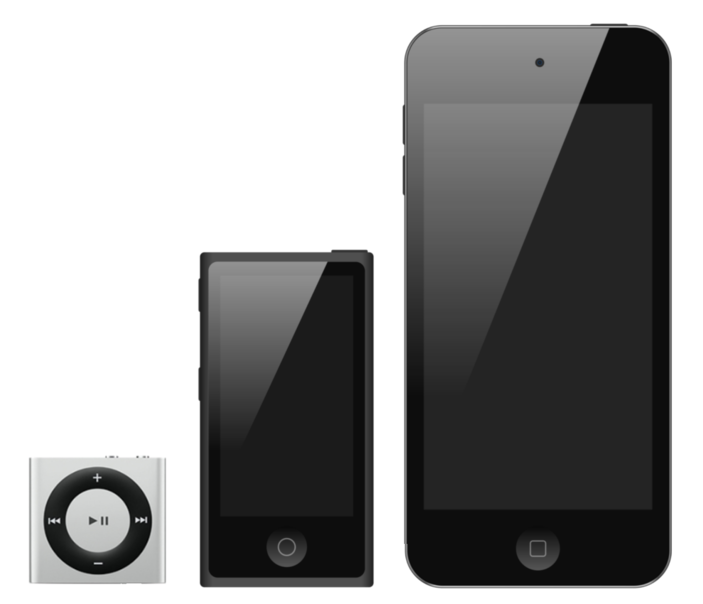The iPod, a line of portable media players developed by Apple, was a significant product from 2001 to 2022. The initial iPod was released in October 2001, following the Macintosh version of iTunes. Apple sold approximately 450 million iPods. Apple discontinued the iPod line on May 10, 2022. With a lifespan exceeding 20 years, the iPod brand holds the record for the longest-running product line discontinued by Apple.
1958: Braun T3 transistor radio designed by Dieter Rams
In 1958, The original iPod's physical appearance was inspired by the Braun T3 transistor radio designed by Dieter Rams.
1991: Earliest Recorded Use of "iPOD" Trademark
In 1991, the earliest recorded use in commerce of an "iPod" trademark was by Chrysalis Corp. of Sturgis, Michigan, styled "iPOD", for office furniture.
1997: Existing of Portable MP3 Players
Since 1997, portable MP3 players had already existed, but Apple found them to be lacking in terms of user interface, capacity, and portability.
March 1998: First iPod Kiosks Demonstrated
In March 1998, the first iPod kiosks were demonstrated to the public in New Jersey.
January 2000: Commercial Use of iPod Kiosks
In January 2000, commercial use of the iPod kiosks began.
July 2000: iPod Trademark Listed
In July 2000, Joseph N. Grasso of New Jersey listed an "iPod" trademark with the U.S. Patent and Trademark Office (USPTO) for Internet kiosks.
October 23, 2001: First iPod Released
On October 23, 2001, Apple released the first version of the iPod, a portable media player.
2001: Venture Discontinued
By 2001, the venture for the iPod trademark had apparently been discontinued
2001: Tony Fadell Hired by Apple
In 2001, Tony Fadell was hired by Apple as an independent contractor to work on the iPod project, which was code-named project P-68.
2001: Name "iPod" Proposed
In 2001, the name "iPod" was proposed by Vinnie Chieco, inspired by "Open the pod bay doors, Hal" from 2001: A Space Odyssey.
April 28, 2003: iTunes Store Introduced
On April 28, 2003, the iTunes Store was introduced, an online media store run by Apple and accessed through iTunes.
November 14, 2003: Apple Announces Battery Replacement Program
On November 14, 2003, Apple announced a battery replacement program, a week before a high publicity stunt and website by the Neistat Brothers. The initial cost was US$99.
November 2003: iPod Trademark Registered by USPTO
In November 2003, the "iPod" trademark was registered by the USPTO (or TSPMO).
2003: Class Action Lawsuits Filed Against Apple
In 2003, class action lawsuits were brought against Apple complaining that the battery charges lasted for shorter lengths of time than stated and that the battery degraded over time. The lawsuits were settled by offering individuals with first- or second-generation iPods either US$50 store credit or a free battery replacement, and offering individuals with third-generation iPods an extended warranty.
January 8, 2004: HP to Sell HP-Branded iPods
On January 8, 2004, Hewlett-Packard (HP) announced that they would sell HP-branded iPods under a license agreement from Apple.
January 2004: iPod Market Share Increase
During the year from January 2004 to January 2005, the high rate of iPod sales caused its U.S. market share to increase from 31% to 65%.
October 2004: iPod Dominates Digital Music Player Sales
Since October 2004, the iPod line has dominated digital music player sales in the United States, with over 90% of the market for hard drive-based players and over 70% of the market for all types of players.
November 2004: Creative CEO Declares War on the iPod
In November 2004, Creative's CEO "declared war" on the iPod. This occurred during a period where the iPod faced competition from various companies.
January 2005: iPod Market Share Increase
During the year from January 2004 to January 2005, the high rate of iPod sales caused its U.S. market share to increase from 31% to 65%.
July 2005: HP Stopped Selling iPods
In July 2005, HP stopped selling iPods due to unfavorable terms and conditions imposed by Apple.
July 2005: iPod Market Share Reaches 74%
In July 2005, the iPod's U.S. market share was measured at 74%.
August 9, 2005: Creative Technology Granted "Zen Patent"
On August 9, 2005, Creative Technology was granted a patent, dubbed the "Zen Patent," related to the music selection interface used by the iPod line. Creative Technology was one of Apple's main rivals in the MP3 player market.
August 2005: Apple Receives Third "Non-Final Rejection"
In August 2005, Apple's patent application to the United States Patent and Trademark Office for "rotational user inputs", as used on the iPod interface, received a third "non-final rejection" (NFR). Also in August 2005, Creative Technology announced that it held a patent on part of the music selection interface used by the iPod line.
September 2005: First Generation iPod Nano Overheating Issues
The first generation iPod Nano may overheat and pose a health and safety risk. Affected iPod Nanos were sold between September 2005 and December 2006 due to a flawed battery from a single manufacturer. Apple recommended users stop using affected devices.

October 12, 2005: Sale of Videos Announced
On October 12, 2005, Apple announced the sale of videos through the iTunes Store.
2005: Low iPod Market Share in South Korea
As of 2005, Apple held a market share of less than 2% in South Korea, compared to market leaders iriver, Samsung and Cowon.
2005: Patent Infringement Lawsuits Filed
In 2005, Apple faced two lawsuits claiming patent infringement by the iPod line and its associated technologies.
2005: Lowered Cost of Battery Replacement Program
In 2005, Apple lowered the cost of its battery replacement program to US$59.
2005: iPod Automobile Interface Released
In 2005, BMW released the first iPod automobile interface, allowing drivers of newer BMW vehicles to control an iPod using either the built-in steering wheel controls or the radio head-unit buttons.
2005: Trademark Assigned to Apple
In 2005, Joseph Grasso assigned the "iPod" trademark to Apple Computer, Inc.
2005: iPods Criticized for Short Lifespan and Fragile Hard Drives
In 2005, a survey found that the iPod line had an average failure rate of 13.7%. In late 2005, users complained that the surface of the first-generation iPod Nano could become scratched easily. Apple began shipping these iPods with protective sleeves.

2005: Rapid Growth in iPod Sales
In 2005, there was rapid growth in iPod sales.
May 15, 2006: Creative Files Suit Against Apple
On May 15, 2006, Creative Technology filed a suit against Apple with the United States District Court for the Northern District of California. Creative also asked the United States International Trade Commission to investigate whether Apple was breaching U.S. trade laws by importing iPods into the United States.
June 11, 2006: Report of Poor Labor Practices
On June 11, 2006, The Mail on Sunday reported that iPods are mainly manufactured by workers who earn no more than US$50 per month and work 15-hour shifts. Apple investigated the case and found that employees worked over 60 hours a week for 35% of the time and worked more than six consecutive days for 25% of the time.
August 24, 2006: Apple and Creative Announce Settlement
On August 24, 2006, Apple and Creative announced a broad settlement to end their legal disputes. As part of the settlement, Apple paid Creative US$100 million for a paid-up license to use Creative's awarded patent in all Apple products. Creative then announced its intention to produce iPod accessories by joining the Made for iPod program.
September 12, 2006: Full-Length Movies Available
On September 12, 2006, full-length movies became available on the iTunes Store.
September 2006: iTunes Store Offers Games
In September 2006, the iTunes Store began to offer additional games for purchase with the launch of iTunes 7, compatible with the fifth generation iPod with iPod software 1.2 or later.
December 2006: First Generation iPod Nano Overheating Issues
The first generation iPod Nano may overheat and pose a health and safety risk. Affected iPod Nanos were sold between September 2005 and December 2006 due to a flawed battery from a single manufacturer. Apple recommended users stop using affected devices.

2006: iPod Production Workforce
As of 2006, the iPod was produced by about 14,000 workers in the U.S. and 27,000 overseas. The salaries attributed to this product were overwhelmingly distributed to highly skilled U.S. professionals, as opposed to lower-skilled U.S. retail employees or overseas manufacturing labor.
2006: Equalizer Sound Distortion Issue
For all iPods released in 2006 and earlier, some equalizer (EQ) sound settings can easily distort the bass sound, even on undemanding tracks.
2006: U2 Special Edition iPod Released
In 2006, Apple partnered with Irish rock band U2 to present a special edition of the 5th-generation iPod with a black stainless steel back and signatures of the band members engraved on the back. The special edition entitled purchasers to an exclusive video with 33 minutes of interviews and performance by U2, downloadable from the iTunes Store.
December 31, 2006: Foxconn Workers Form Union
On December 31, 2006, workers at the Foxconn factory in Longhua, Shenzhen formed a union affiliated with the All-China Federation of Trade Unions, the Chinese government-approved union umbrella organization.
January 2007: Apple Reports Record Revenue
In January 2007, Apple reported record quarterly revenue of US$7.1 billion, of which 48% was made from iPod sales. Apple suggests that iPod users are likely to purchase other Apple products such as Mac computers.
January 2007: iPod Market Share Reaches 72.7%
In January 2007, according to Bloomberg Online, the iPod market share reached 72.7%.
April 9, 2007: Apple Sells 100 Millionth iPod
On April 9, 2007, it was announced that Apple had sold its one-hundred millionth iPod, making it the best-selling digital music player of all time. Its second-quarter revenue was US$5.2 billion, of which 32% was made from iPod sales.
July 3, 2007: Universal Music Group's Contract
On July 3, 2007, Universal Music Group decided not to renew their contract with the iTunes Store and instead supplied iTunes in an 'at will' capacity.
September 5, 2007: iTunes Wi-Fi Music Store Debuted
On September 5, 2007, Apple debuted the iTunes Wi-Fi Music Store, allowing users to access the Music Store from an iPhone or iPod Touch and download songs directly to the device.
October 17, 2007: Price Reduction for iTunes Plus Songs
On October 17, 2007, Apple lowered the cost of individual iTunes Plus songs to US$0.99 per song, the same as DRM encoded tracks.
2007: Airlines Install iPod Seat Connections
Beginning in mid-2007, four major airlines, United, Continental, Delta, and Emirates, reached agreements to install iPod seat connections.
2007: iPod Interface Modified
In 2007, Apple modified the iPod interface again with the introduction of the sixth-generation iPod Classic and third-generation iPod Nano by changing the font to Helvetica and splitting the screen in half, displaying the menus on the left and album artwork, photos, or videos on the right.
2007: Rapid Growth in iPod Sales
In 2007, there was rapid growth in iPod sales.
October 21, 2008: iPod Revenue Decline
On October 21, 2008, Apple reported that only 14.21% of total revenue for fiscal quarter 4 of the year 2008 came from iPods.
2008: iPod Sales Contribute to Apple's Revenue
In 2008, 42% of Apple's revenue for the first fiscal quarter came from iPod sales, followed by 21% from notebook sales and 16% from desktop sales.
2008: Slow Growth in iPod Sales
In 2008, there was slow growth in iPod sales.
January 6, 2009: DRM Removed from 80% of Music Catalog
On January 6, 2009, Apple announced that DRM had been removed from 80% of the music catalog and that it would be removed from all music by April 2009.
April 2009: DRM Removed from All Music
By April 2009, Apple had removed DRM from all music in its catalog.
June 2009: Apple CFO Expects MP3 Player Decline
In June 2009, Apple CFO Peter Oppenheimer explained that Apple expected their traditional MP3 players to decline over time as they cannibalized themselves with the iPod Touch and the iPhone.
September 9, 2009: iPod Cumulative Sales Exceed 220 Million
At the September 9, 2009 keynote presentation at the Apple Event, Phil Schiller announced total cumulative sales of iPods exceeded 220 million.
2009: Employee Suicide at Foxconn
In 2009, an employee at Foxconn killed himself when an Apple prototype went missing, and claimed in messages to friends, that he had been beaten and interrogated.
2009: Peak in iPod Sales
In 2009, sales of iPods peaked in Q1.
2010: iPhone Sales Overtake iPod Sales
During 2010, iPhone sales surpassed those of the iPod.
2011: iPod Holds 70% Market Share
As of 2011, iPod held a 70% market share in global MP3 players. Its closest competitor was the Sansa line from SanDisk.
September 12, 2012: Introduction of Lightning Connector
On September 12, 2012, Apple introduced a new 8-pin dock connector, named Lightning, with the announcement of the iPhone 5, the fifth-generation iPod Touch, and the seventh-generation iPod Nano.
September 2012: Apple Reports 350 Million iPods Sold Worldwide
As of September 2012, Apple reported that the total number of iPods sold worldwide was 350 million.
2013: Reports of New Volume Limit Option
In late 2013, users reported a new option that allowed them to disable the EU volume limit on new sixth-generation iPods.
2013: No New iPod Model Introduced
Since 2009, the company's iPod sales have continually decreased every financial quarter and in 2013 a new iPod model was not introduced onto the market.
2015: New Color Schemes Spotted
In mid-2015, several new color schemes for all of the current iPod models were spotted in the iTunes 12.2 update.
July 27, 2017: iPod Nano and Shuffle Discontinued
On July 27, 2017, Apple removed the iPod Nano and Shuffle from its stores, marking the end of Apple's production of standalone music players.

May 10, 2022: iPod Product Line Discontinued
On May 10, 2022, Apple discontinued the iPod product line after over 20 years.
Mentioned in this timeline
California is a U S state on the Pacific Coast...

Samsung Group is a South Korean multinational manufacturing conglomerate and...

An apple is a widely cultivated round edible fruit originating...
China officially the People's Republic of China is an East...
The iPhone is a smartphone developed and marketed by Apple...
Korea is a peninsular region in East Asia comprised of...
Trending

44 minutes ago Kelvin Sampson's Coaching Philosophy and Houston Cougars' SLAM Magazine Cover

44 minutes ago Trace Adkins Hints at Retirement with 2026 Tour Potentially Being His Last

44 minutes ago Urgent search: 3-year-old girl missing in Avondale, Amber Alert issued for safe return.

45 minutes ago Javonte Williams Signs 3-Year, $24 Million Contract Extension with the Dallas Cowboys

45 minutes ago Jackie Chan Shines in 'Unexpected Family' and Berlin Film Festival Recognition
45 minutes ago DAZN and Matchroom Boxing Extend Media Rights Deal for Five Years
Popular

Jesse Jackson is an American civil rights activist politician and...

Barack Obama the th U S President - was the...

Ken Paxton is an American politician and lawyer serving as...
Randall Adam Fine is an American politician a Republican who...

Bernie Sanders is a prominent American politician currently serving as...

Michael Joseph Jackson the King of Pop was a highly...


